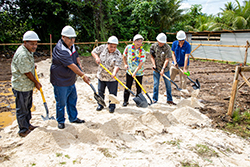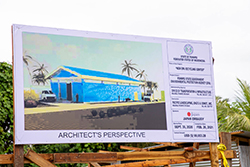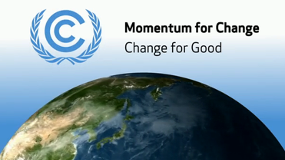Japan and Pohnpei break ground on a new recycling center at Dekehtik Landfill site
- Details
- Category: News
- Published: Monday, 30 November -0001 00:00
- Written by Bill Jaynes
- Hits: 330
By Bill Jaynes
The Kaselehlie Press
October 7, 2020
 Pohnpei—The government of Japan has long been supportive of waste management projects in the Pacific though its regional J-PRISM (Japanese Technical Cooperation Project for Promotion of Regional Initiative on Solid Waste Management) program and that support continued through its Grant Assistance for Grassroots Human Security Program with the donation of over $87,000 for the construction of a new recycling center. This afternoon, Pohnpei Governor Reed Oliver and other Pohnpei State government representatives participated in a ground breaking ceremony at the Dekehtik Land Fill where the new recycling center is already under construction.
Pohnpei—The government of Japan has long been supportive of waste management projects in the Pacific though its regional J-PRISM (Japanese Technical Cooperation Project for Promotion of Regional Initiative on Solid Waste Management) program and that support continued through its Grant Assistance for Grassroots Human Security Program with the donation of over $87,000 for the construction of a new recycling center. This afternoon, Pohnpei Governor Reed Oliver and other Pohnpei State government representatives participated in a ground breaking ceremony at the Dekehtik Land Fill where the new recycling center is already under construction.
The government of Japan donated equipment to Pohnpei’s aluminum can recycling center which, since 2017 has recycled a total of approximately 15 million aluminum cans. The program provides monetary motivation to Pohnpei residents to recycle cans rather than carelessly discarding on roadsides and other places or filling the already heavily used land fill.
Ambassador Sobashima Hidenobu said that the location and size of the current recycling center are not ideal for the proper collection of a large number of cans and that the current site causes traffic snarls on recycling days. Further, the piles of cans waiting to be pressed has begun to cause an environmental problem with gathering mosquitoes and other insects.
“Every year we are importing millions of aluminum cans to our islands and we are only collecting and recycling about 50 percent of that and the rest remain litters and pollutants to our pristine environment,”
Governor Oliver reported during his speech. “The recycling rate is reported to be low according to EPA because there are logistical and practical issues that limit our ability to fully engage. Some of the reasons have to do with limited space to collect and store and of course there is no recycling center to maximize the effort of collect and redemption (trade-in).”
Ambassador Sobishima said that the new center will also include a very high powered metal press that will likely be able to compress other much heavier metals in addition to compressing aluminum cans. The new press will also allow for a significant increase in the number of cans that the center can process. Additionally, the relocation of the process from the town area will greatly ease traffic for those utilizing the center.
“Furthermore, the habit of recycling taking place in Pohnpei people will nurture the culture against littering. Thus the project should benefit all 36,000 people living on Pohnpei island,” the Ambassador said.
Japan, through J-PRISM has already provided huge amounts of assistance to Pohnpei both in terms of grants but also in terms of technical expertise. Before JICA and J-PRISM assistance, the Dekehtik landfill operated as an open dump creating all sorts of environmental problems, but that is no longer the case. JICA experts assisted to set the landfill up using the Fuguoka method, a method of waste management developed at a university in Fuguoka, Japan that handles waste products in dug pits with leachates, the liquids produced by decaying wasted, being drained off to a pool and air circulating to the bottom of the waste pits even after the pits are full and have been covered back over with topsoil. The first pit set up with the method at the Dekehtik site has long since been full and re-covered and a second pit set up in the same way is now being used. The environmental impacts of waste using the method are substantially reduced.
The Pohnpei State Legislature authorized an additional $12,000 for the construction of the center.






